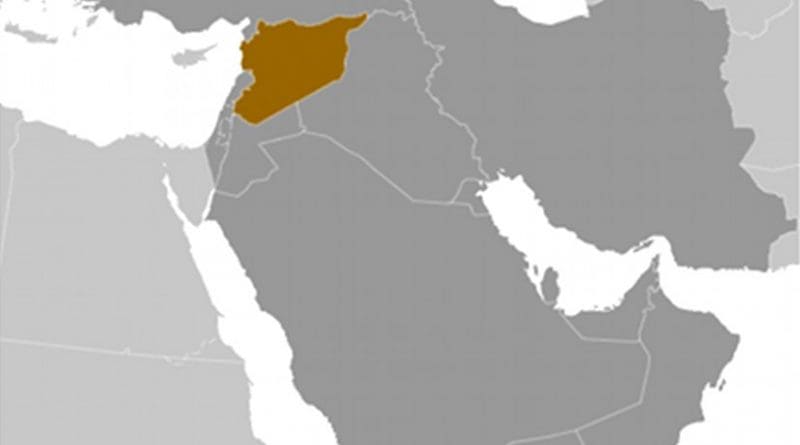Syria In The Throes Of Religious War – OpEd
By Press TV
By Hassan Hanizadeh
The barbaric massacre of three Syrian families from the Alawi tribe in the city of Homs, 165 kilometers to the north of Damascus, shows that the demonstrations against the Assad government has been derailed from its legal and legitimate course.
These three Alawi families, who had no political affiliation whatsoever to the Syrian government, were killed in the most callous manner by the Salafis of the city of Homs.
Following the incident, some of the Alawis outraged by the murder attacked the Sunni mosques of the city, causing clashes with the Salafis.
The slaying of the three families also triggered a wave of resentment and enmity among the Shiites and Alawis against the inhumane acts of the Syrian Salafis so much so that it is feared that a religious civil war might engulf Syria.
Syria’s Alawis, which constitute 15 percent of the country’s 25-million population, never had any role in the country’s power structure prior to the 1970 coup de tat, staged by Hafez Assad.
This community, subsumed under the Shiite faith, has always been subjected to the Salafis’ harassment and abuse. A great number of them fearing Salafis’ night raids were forced to migrate to the heights of Jabal Horan in Southern Syria during the Ottoman rule.
The coup mounted by Hafez Assad, Syria’s former Prime Minister, introduced the Alawis into the power structure; they, however, never sought revenge against the Salafis.
The Salafis, with the complicity of Akhvan al Moslemin and aiming to overthrow the Alawi government, however staged an armed rebellion against the Syrian State in 1982.
Accordingly Hafez Assad in a violent move murdered thousands of Syria’s Salafis and Akhvan al Moslemin affiliates in the cities of Hama, Homs and Adlab.
Though the armed rebellion of the Salafis and Akhvan al Moslemin was suppressed in that year, they have always been casting about for an opportunity to wreak revenge on the country’s Alawi government.
The recent incidents in the Arab World and the facile fall of the Egyptian and Tunisian dictators spurred Syria’s Salafis to unite against Bashar Assad on the pretext of democracy and reforms.
Although the demands of the Syrian people for change and reforms were perfectly legitimate, the Salafis, who had no interest in democracy and equality, infiltrated the anti-government demonstrations.
During the recent protests, Syria’s Salafis, through forming death squads, mounted several terror attacks on the Syrian soldiers and police officers in an effort to turn the rallies violent. More than 1200 Syrian police officers and army soldiers are said to have been killed by the violence-seeking Salafi death squads.
This group also raided several Shiite and Alawi mosques and other religious buildings in the cities of Homs, Adlab, Latakia, and Hama and set them on fire.
The Alawis deployed in the Armed Forces and Security apparatuses reacted to such untenable violence against their peers in faith and belief and murdered a number of violent Salafis.
Regretfully, some of the brutal Salafi groups who are in a kind affiliated with al-Qaeda receive financial and arms aids from some of the Arab countries and Lebanon’s political groups. Saudi Arabia and March 14 alliance led by Saad Al-Hariri, former Prime Minister of Lebanon, provide the Salafis with a plethora of financial and logistical aid.
The objective behind toppling the Assad government is to form a new regime, similar to the Taliban in Afghanistan and the Al Saud in Saudi Arabia, with the aim of embarking on the massacre of the Alawis and Shiites.
The United States and the West, heedless of the potential ramifications of the formation of such a violence-seeking Salafi government, have always taken a stance against the Assad government.
Syrian President Bashar Assad initiated political reforms concurrent with the onset of the anti-government demonstrations in various cities of the country. The elimination of the Articles 8 and 49 of the Syrian Constitution, the abolition of Emergency Laws, and the release of political prisoners were some of the measures adopted by Bashar Assad to contain the wave of public protests and implement political reforms.
While Article 8 of the Syrian Constitution defines the Ba’ath Party as the country’s sole ruling party, Article 49 decrees capital punishment for those affiliated with the Islamic and Salafi Parties.
During the past month, the Syrian government also commenced wide-ranging talks with the opposition leaders, and a number of agreements were reached.
This comes as the brutal Salafis, particularly the leaders of this faith, have announced as Haram (forbidden) any negotiation with the Assad government, stressing that an armed fight is the only means of attaining their objectives.
For that reason, the initiation of unjustifiable violence by the Salafi leaders and the blind killings of Alawis and Shiites draw Syria towards a civil war similar to the Lebanese Civil War in the 70s and 80s. It would be expected that a religious civil war, if started in Syria, would not be limited to the borders of this country and would spread to Lebanon and Turkey as the Shiite and Alawi tribes in Lebanon and Turkey will never remain indifferent towards the murdering of their peers in Syria and will definitely rush to their aid.

